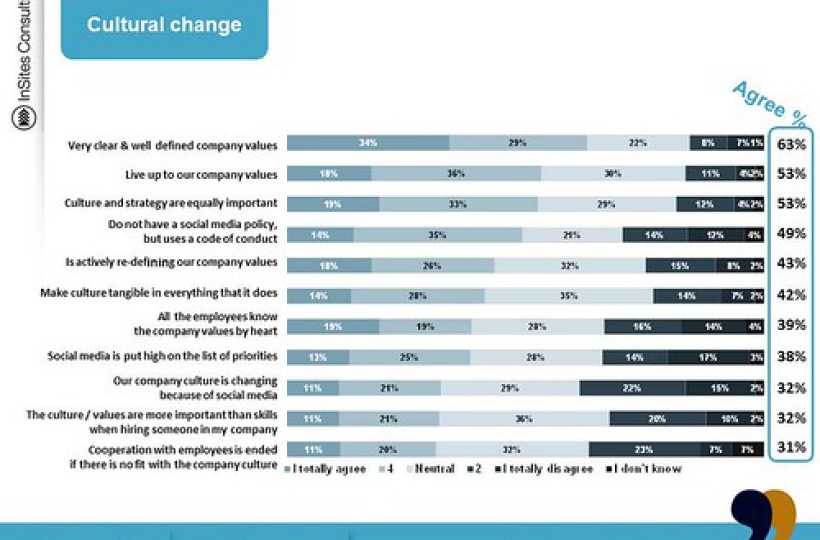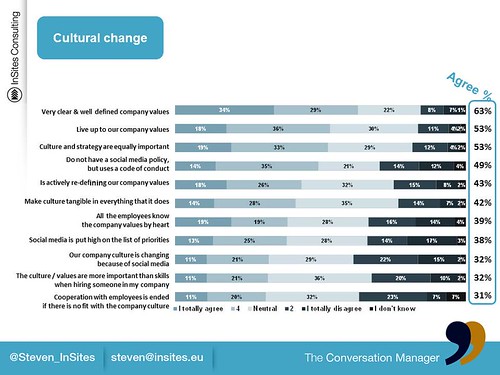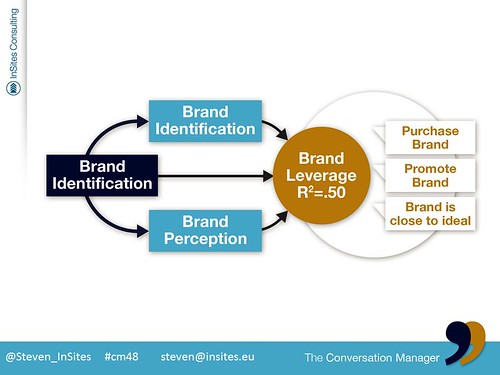Corporate Culture is the Heart of The Conversation Company

Last week, I described the context most businesses are in: a lot of conversation potential left, but somehow companies take the wrong decisions in finding a way to optimize the conversation potential. In today’s post, we dive into the core of the Conversation Company: a Corporate Culture where the client has a central position. A culture that is characterized by an open, authentic and positive spirit.
Company Culture is the Conversation Guide of your company
The most commonly used definition of company culture is as follows:
“Company culture is a series of shared values and convictions which help individuals to understand the functioning of the company. A clear company culture makes it easy for the employees to know precisely what the company expects of them. Culture gives people an insight into the type of behaviour that is desired within the company.
Research has confirmed that a company culture often forms the basis for the successful implementation of a strategy. A strong company culture also has a positive impact on the performance and productivity of its employees. The culture is a kind of „mental programming‟ for an organisation, which distinguishes it from its competitors.
Your culture is the personality of your organisation and the foundation on which your Conversation Company is built. Your staff and your customers make this culture tangible to others. This involves a method of reasoning that works from inside to outside. A traditional company is first and foremost interested in making its shareholders happy. Making customers happy only comes in the second place, with the staff a poor third. A Conversation Company turns this logic on its head. If the staff are happy, they will be pleased to make the customers happy; and if the customers are happy, profits will rise, so that the shareholders will also be happy. The CEO of Southwest Airlines puts it like this:
“We take good care of our staff. Our staff take good care of our customers. And our customers take good care of our shareholders.”
Your company culture is the conversation guide for employees and clients. It makes it clear for employees how to behave and how to communicate with clients. For clients it becomes clear what to expect.
THERE IS STILL SOME WORK TO DO FOR COMPANIES IN BRINGING THE CULTURE TO LIFE
The many workshops that we have conducted with companies suggested to us that the factors which prompt organisations to start with Conversation Management have little to do with company size or sector. The companies which are furthest along the conversation road have either had a social media crisis in recent years (Dell, Comcast) or have a very strong company culture (Zappos, Southwest Airlines). Research carried out for my new book has confirmed these general impressions. 82% of the companies that already focus strongly on customer-oriented thinking have clear and consistently applied company values, in comparison with 54% of the companies that are at the start of their change process. 77% of the advanced companies think that culture is as important as strategy, against just 31% in the starter companies.
The same research shows that only 63% of American and British companies have clearly defined corporate values. Just 56% make efforts to actively manage these values. 45% want to amend their values because of the increasing importance of social media.
Every company needs appropriate values. There is no point trying to introduce the values of Zappos into Ford, or vice versa. Your values have a great impact on the conversations about your company. If staff interact with people on the basis of these values, your company will speak with a single voice, even though it has a thousand different mouths. This uniform approach means that your customers will get a clear and consistent experience, every time they come into contact with your organisation. This leads to conversations that are appropriate for your company. Moreover, it ensures that the conversations are „believable‟, and therefore impactful. If your company does not have clear values, each member of staff will be talking to your customers as an individual, not as the representative of a coherent whole. In this instance, the conversations will fly off in many different directions, and will not have the impact that the Conversation Company seeks.
Many companies have similar values. The four most frequently cited values are: result-oriented, customer-oriented, good service and integrity. There is nothing wrong with these values, but they are hardly likely to excite your customers – at least, not expressed in this manner. If you read the ten values of Zappos, you immediately get a „feel‟ of what the company is like and what it stands for. Values must help you to differentiate your company.
To such an extent, that after a while the outside world begins to describe your company in terms of your chosen values. Here at InSites Consulting, it gives us great pleasure if one of our customers tells us that he/she thinks that we are a passionate company. Passion is one of our core values. And if our customers are able to feel this passion and tell us that they have experienced it, this is a nice compliment – and shows that we are still on the right lines.
CULTURE MUST LEAD TO IDENTIFICATION WITH YOUR COMPANY
Our research has also shown that the ability of your employees to identify with your company values is the key to a good company culture. The art when defining your values is therefore to ensure that people are able to recognise themselves in them. If staff are able to relate to the values of the company, a powerful mental and emotional bond will be created. This bond leads in turn to positive conversations. If your people feel good, they will converse enthusiastically about your company.
There are three values in particular that can help to ensure a strong identification with your culture, and so lead to positive conversations:
- Open: Nike describes this perfectly: „transparency is a strength, not a threat.‟ The Conversation Company succeeds in communicating openly with its employees and customers. An open attitude leads to the development of trust. Clear and open communication always encourages trust between people, and trust is the basis of impactful conversations. „Open‟ can be interpreted in many different ways. You can be open to negative criticism. You can be open to collaboration with customers for the development of new products. You can be open to the creation of space for staff and customers who want to help your company. Our research showed that the companies which are furthest advanced in terms of customer-oriented thinking are also the most open to the idea of giving trust to their employees.
- Authentic: Being genuine and coming across to the public as genuine are crucial factors in ensuring the credibility of conversations. In his book „How cool brands stay hot‟ my InSites Consulting partner Joeri Van den Bergh argues that authenticity is one of the aspects that the brands of today must have, if they want to convince the new generation of consumers (generation Y). Being honest with your staff, honest with your customers and honest towards society are the key elements in acquiring this authenticity. Recent surveys have shown that marketeers regard authenticity as the most important trend in the years ahead.
- Happiness: This factor is also mentioned in „How cool brands stay hot‟. Our own research has shown that the modern consumer likes positive emotions. Being positive and making people feel good is an important conversation starter.
All three of these values are part of a strong culture. But it is not our intention that you copy them literally! It’s best to use them as a source of inspiration when thinking about your own „appropriate‟ set of values. Search for values that match your image and needs. Above all, search for values that you know you can truly live up to. These values will determine the direction of everything that your company does: the recruitment of staff, the development of new products, the creation of new advertising campaigns, etc.
A company culture where the client has a central position, supported with values like openness, authenticity and happiness is the heart of The Conversation Company. This week, we’ll talk about the role of people. People make culture tangible and the Conversation Company uses people to positively leverage on towards its path for growth.

